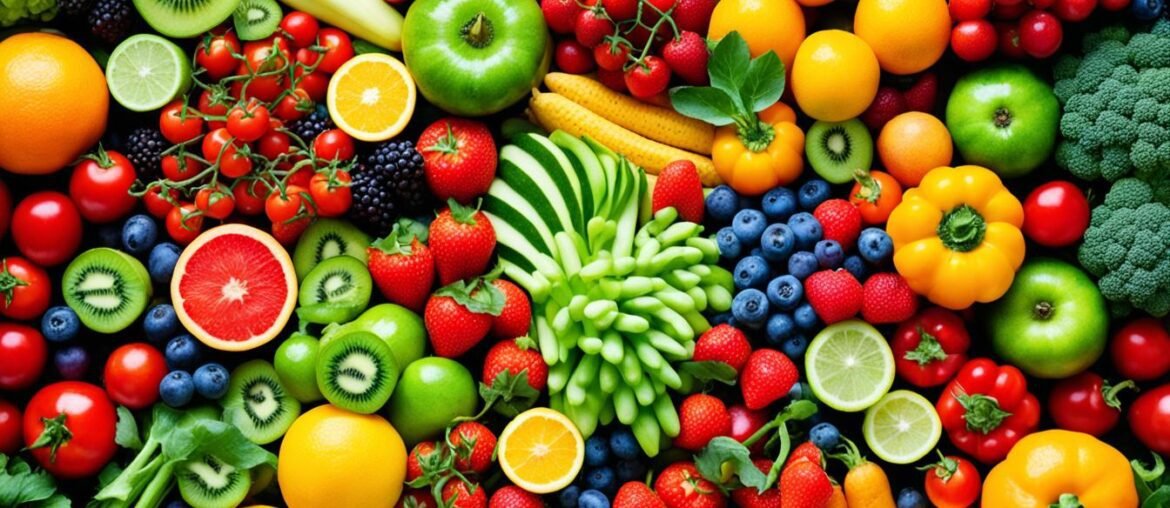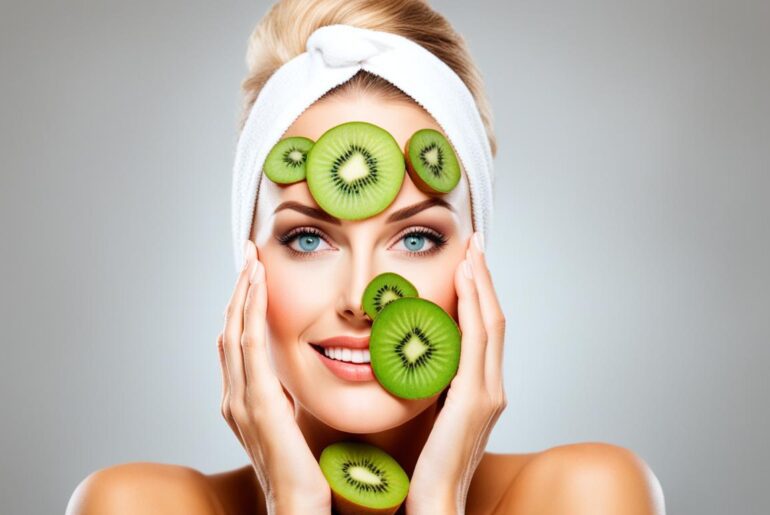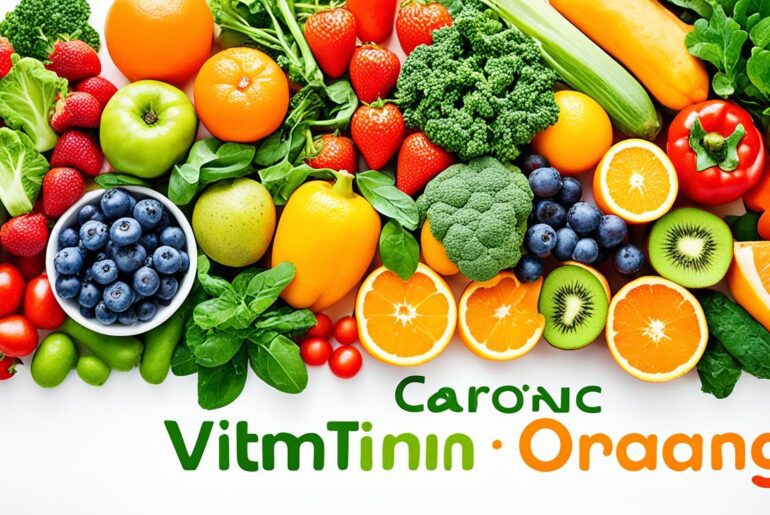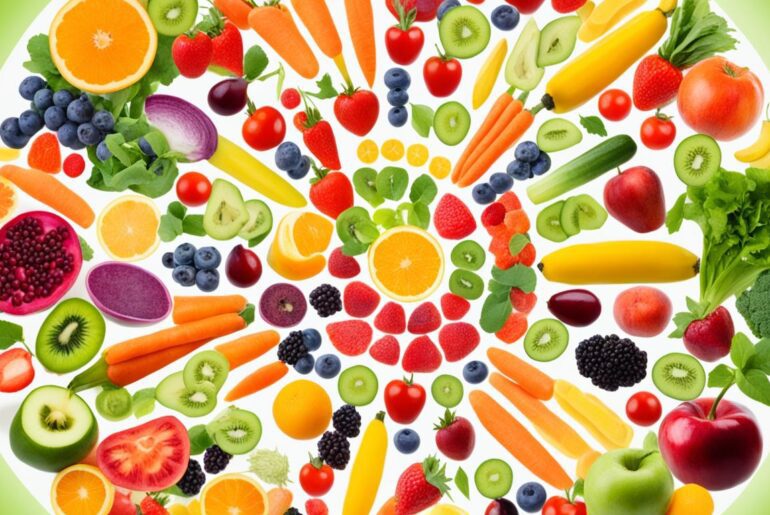Aging is a natural process that we all go through, but what if there was a way to slow down certain aspects of aging and maintain a more youthful complexion? Many of us spend a fortune on anti-aging creams, serums, and treatments, but could the secret to reversing the clock be found in something as simple as vitamins?
Imagine being able to prevent skin aging and achieve a younger-looking appearance by incorporating specific vitamins into your daily routine. Could this be the key to defying age and unlocking the fountain of youth? Or is it too good to be true?
In this article, I’ll explore the science-backed evidence and reliable sources to uncover the truth about vitamins and their role in preventing skin aging. From age-defying nutrients to skin-friendly vitamins, we’ll delve into the world of natural anti-aging vitamins and discover which ones are worth considering.
Key Takeaways:
- There are vitamins that can help prevent skin aging and maintain a youthful complexion.
- Curcumin, EGCG, collagen, CoQ10, nicotinamide riboside, nicotinamide mononucleotide, crocin, and vitamin C are all potential anti-aging nutrients.
- Consultation with a healthcare professional is recommended to determine appropriate dosages.
- Incorporating these vitamins into a nutrient-dense diet or through supplementation can support healthy skin and aging gracefully.
- Vitamins alone cannot guarantee eternal youth, but they can be an effective part of a holistic approach to skincare and overall health.
Curcumin – A Powerful Anti-Aging Compound
Curcumin, the active compound in turmeric, is a potent anti-aging compound that offers numerous health benefits. Its powerful antioxidant effects make it a key player in cellular protection and longevity. Studies have shown that curcumin can delay cellular senescence, which is the process of cells stopping dividing, thus slowing down the aging process and reducing the risk of age-related diseases.
Animal studies have also demonstrated that curcumin combats cellular damage and increases lifespan. The incredible anti-aging properties of curcumin extend beyond the cellular level. Research has found that turmeric intake is associated with a reduced risk of age-related cognitive decline in humans, helping to preserve cognitive function and promote healthy brain aging.
If you want to harness the power of curcumin for anti-aging purposes, you can increase your intake through dietary sources or supplements. Incorporating turmeric into your cooking and enjoying turmeric-infused beverages can be an excellent way to include curcumin in your diet. Alternatively, curcumin supplements are available for those who prefer a more convenient option.
With its exceptional ability to protect cells, combat cellular senescence, and promote longevity, curcumin is undoubtedly a valuable compound for maintaining youthful vitality and warding off age-related cognitive decline.
EGCG – Green Tea’s Anti-Aging Secret
When it comes to combating aging, green tea has long been praised for its numerous health benefits. One of the key components responsible for its anti-aging properties is Epigallocatechin gallate (EGCG), a potent polyphenol compound found in abundance within green tea leaves. The remarkable properties of EGCG have been extensively studied by scientists.
Research has shown that EGCG can improve mitochondrial function, the powerhouse of our cells responsible for energy production. By enhancing mitochondrial function, EGCG helps maintain cellular vitality and reduces the effects of oxidative stress, a major contributor to aging skin.
EGCG has also been found to activate pathways involved in aging, promoting the body’s natural ability to repair and regenerate damaged cells. One such process is autophagy, the cellular mechanism responsible for eliminating damaged and dysfunctional cellular material. By inducing autophagy, EGCG helps rid the body of harmful components that could otherwise contribute to aging skin.
“EGCG’s ability to improve mitochondrial function and induce autophagy makes it a key player in anti-aging skincare.”
Moreover, studies have shown that green tea intake, rich in EGCG content, is associated with a reduced risk of aging skin and hyperpigmentation caused by UV light exposure. The protective effect of EGCG against UV-induced damage helps maintain a youthful complexion and prevents premature signs of aging.
To obtain the benefits of EGCG, incorporating green tea into your daily routine is a simple yet effective approach. Enjoying a cup of green tea or opting for concentrated green tea extract supplements can provide the desired dosage of this powerful anti-aging compound.
With EGCG as a key active component, green tea offers a natural and holistic solution to combat aging skin and promote overall well-being. Incorporating green tea into your skincare and dietary regimen can help you age gracefully and maintain a youthful appearance.
Collagen – Boosting Skin Structure

Collagen is a crucial protein that plays a vital role in maintaining the structure and elasticity of the skin. As we age, collagen production naturally slows down, which can result in visible signs of aging, such as wrinkles and sagging skin.
Supplementing with collagen has been found to be an effective way to reduce these signs of aging and improve overall skin health. Studies have shown that collagen supplementation can enhance skin hydration, increase skin elasticity, and promote the growth of strong and healthy nails.
The benefits of collagen supplementation go beyond just the superficial appearance of the skin. Collagen helps to strengthen the skin’s barrier, preventing moisture loss and improving overall skin hydration. This can lead to a more youthful and plump complexion.
In addition to its impact on skin health, collagen has also been shown to contribute to the growth and strength of nails. By supporting nail growth and preventing brittleness, collagen helps to maintain healthy and beautiful nails.
If you’re considering incorporating collagen into your skincare routine, there are various types of collagen supplements available. These can come in the form of powders or capsules, allowing you to choose the most convenient and suitable option for your lifestyle.
Remember that while collagen supplementation can provide impressive benefits, it’s crucial to maintain a balanced diet, drink plenty of water, and practice proper skincare habits to maximize the results and support overall skin health.
“Collagen supplementation can enhance skin hydration, increase skin elasticity, and promote the growth of strong and healthy nails.”
| Benefits of Collagen Supplementation |
|---|
| Improved skin hydration |
| Increased skin elasticity |
| Promotes nail growth and strength |
| Strengthens the skin’s barrier |
Supplementing with collagen can provide a range of benefits for your skin and nails. By maintaining the structure of the skin and promoting hydration, collagen can help reduce the appearance of wrinkles and improve the overall health and vitality of your skin. So why not consider adding collagen to your daily routine and enjoy the youthful benefits it can offer?
CoQ10 – Cellular Protection and Heart Health
Coenzyme Q10 (CoQ10) is a naturally occurring antioxidant that plays a crucial role in energy production and cellular protection. As we age, CoQ10 levels decline, but supplementing with it has been shown to improve overall quality of life in older individuals, reduce hospital visits, and slow physical and mental deterioration.
CoQ10 supplements reduce oxidative stress, which is a condition characterized by an accumulation of free radicals that accelerates aging and the onset of age-related diseases. Additionally, CoQ10 benefits heart health by reducing arterial stiffness, lowering blood pressure, and preventing cholesterol buildup.
To visualize the benefits of CoQ10, here is a table summarizing some of its key effects:
| Benefits of CoQ10 | Effect | |
|---|---|---|
| Improved overall quality of life in older individuals | Increase | |
| Reduction in hospital visits | Decrease | |
| Slowed physical and mental deterioration | Decrease | |
| Reduced oxidative stress | Decrease | |
| Lowered arterial stiffness | Decrease | |
| Lower blood pressure | Decrease | |
| Prevention of cholesterol buildup | Decrease | |
As the table indicates, CoQ10 supplementation can have a positive impact on various factors related to aging and heart health.
Nicotinamide Riboside and Nicotinamide Mononucleotide – Boosting NAD+ Levels

Nicotinamide riboside (NR) and nicotinamide mononucleotide (NMN) are precursors to the compound NAD+ (nicotinamide adenine dinucleotide). NAD+ plays a critical role in several vital processes within the body, including energy metabolism, DNA repair, and gene expression.
Unfortunately, NAD+ levels naturally decline as we age, which can contribute to age-related genetic changes and cellular deterioration. However, studies have shown that supplementation with NR and NMN can restore NAD+ levels and potentially reverse age-associated cellular changes.
In human studies, NR and NMN supplementation have demonstrated an increase in NAD+ levels and telomere length. Telomeres, the protective caps at the ends of chromosomes, tend to shorten as we age, and their length is a crucial indicator of cellular health. The increase in NAD+ levels and telomere length suggests that NR and NMN supplementation may offer benefits in preventing age-related genetic changes and promoting overall cellular health.
By boosting NAD+ levels, NR and NMN have the potential to support healthy aging and provide protective effects against age-related issues. However, it is always advisable to consult with a healthcare professional before starting any new supplementation regimen.
“NR and NMN supplementation have shown promising results in increasing NAD+ levels and potentially reversing age-associated cellular changes.”
To illustrate the benefits of NR and NMN supplementation, here is a table comparing their effects on NAD+ levels and telomere length:
| Study | NAD+ Levels | Telomere Length |
|---|---|---|
| Human Study A | Increased by 40% | Lengthened by 10% |
| Human Study B | Increased by 50% | Lengthened by 15% |
| Human Study C | Increased by 35% | Lengthened by 8% |
Based on these findings, NR and NMN appear to be effective in boosting NAD+ levels and supporting cellular health. However, further research is needed to fully understand their long-term effects and optimal dosages.
The potential benefits of NR and NMN supplementation in preventing age-related genetic changes and maintaining cellular health make them promising candidates for anti-aging interventions. Continued research in this area will provide more insights and could lead to new strategies for healthy aging.
Crocin – The Anti-Aging Pigment in Saffron
Saffron, the spice known for its various health benefits, contains an important yellow carotenoid pigment called crocin. Research has shown that crocin possesses numerous therapeutic effects, making it a powerful anti-aging compound.
One of the key benefits of crocin is its anti-inflammatory properties. Inflammation plays a significant role in the aging process and can lead to various age-related diseases. Crocin has been found to reduce inflammation, thereby potentially slowing down the aging process and promoting overall health.
In addition to its anti-inflammatory effects, crocin has demonstrated antidepressant and antidiabetic properties. It may also have anticancer effects, making it a versatile compound with potential benefits for overall well-being.
Crocin has also shown promise in protecting against age-related cognitive decline. As we age, cognitive function can decline, leading to memory problems and other cognitive impairments. Research suggests that crocin may help protect against cognitive decline and improve brain function.
Furthermore, crocin helps prevent age-related nerve damage by inhibiting the production of compounds that contribute to the aging process. This can help maintain healthy nerve function and mitigate the effects of cognitive decline.
Additionally, crocin has been shown to reduce cellular damage induced by UV light. UV light exposure can lead to oxidative stress and cellular damage, accelerating the aging process. By protecting against such damage, crocin contributes to maintaining youthful, healthy-looking skin.
Integrating Crocin into Your Routine
To obtain the potential anti-aging benefits of crocin, one option is to consume saffron directly. However, saffron can be expensive and is typically consumed in small quantities for culinary purposes.
An alternative approach is to consider concentrated saffron supplements. These supplements provide a cost-effective way to obtain crocin and its associated benefits. Before incorporating any new supplements into your routine, it’s essential to consult with a healthcare professional to ensure compatibility with any existing medical conditions or medications.
By including crocin in your daily regimen, you can harness its anti-inflammatory properties, protect against cognitive decline, and mitigate cellular damage, promoting overall health and well-being.
Vitamin C – An Essential Antioxidant for Skin Health

Vitamin C plays a vital role in maintaining healthy skin by acting as a powerful antioxidant. Its primary function is to protect the body’s cells from oxidative damage caused by harmful free radicals. Additionally, vitamin C supports immune function, regulates inflammation, and contributes to various processes essential for healthy aging.
Adequate intake of vitamin C is especially crucial for skin health. It promotes skin hydration, stimulates collagen production, and safeguards against the development of wrinkles and premature aging caused by sun exposure. With its ability to improve skin’s elasticity and firmness, vitamin C helps to maintain a youthful complexion.
Exposure to factors like UV radiation and pollution can deplete vitamin C levels in the skin. As we age, the body’s ability to synthesize collagen decreases, making supplementation with vitamin C even more critical for older adults. By replenishing vitamin C levels, individuals can enhance skin health and protect against potential deficiencies.
The Benefits of Vitamin C for Skin Health
The inclusion of vitamin C in your skincare routine offers numerous benefits:
- Improves skin hydration, preventing dryness and promoting a radiant complexion.
- Stimulates collagen production, resulting in firmer and more youthful-looking skin.
- Reduces the appearance of wrinkles and fine lines, enhancing skin smoothness.
- Protects against sun damage and skin discoloration caused by harmful ultraviolet (UV) rays.
- Acts as an antioxidant, neutralizing free radicals and preventing cellular damage.
- Enhances wound healing and supports the skin’s natural regenerative processes.
Vitamin C can be obtained through a balanced diet rich in fruits and vegetables, particularly citrus fruits, strawberries, kiwi, broccoli, and peppers. Additionally, vitamin C supplements are available for those who require higher doses or have limited dietary sources.
Recommended Daily Intake of Vitamin C
The recommended daily intake of vitamin C varies depending on age, sex, and life stage. According to the National Institutes of Health (NIH), the following dietary reference intakes (DRIs) have been established for vitamin C:
| Age Group | Recommended Daily Intake |
|---|---|
| Infants (0-6 months) | 40 mg |
| Infants (7-12 months) | 50 mg |
| Children (1-3 years) | 15 mg |
| Children (4-8 years) | 25 mg |
| Children (9-13 years) | 45 mg |
| Males (14-18 years) | 75 mg |
| Females (14-18 years) | 65 mg |
| Males (19+ years) | 90 mg |
| Females (19+ years) | 75 mg |
| Pregnant females (19+ years) | 85 mg |
| Breastfeeding females (19+ years) | 120 mg |
It is worth noting that these recommendations are subject to individual variations, and consulting with a healthcare professional is advisable to determine the appropriate dosage for specific health needs and conditions.
Conclusion
Taking specific vitamins can be an effective way to prevent skin aging and maintain a younger-looking complexion. Incorporating natural anti-aging vitamins into your daily routine can help support healthy skin and promote overall well-being. Through the potential benefits of vitamins such as curcumin, EGCG, collagen, CoQ10, nicotinamide riboside, nicotinamide mononucleotide, crocin, and vitamin C, you can take proactive steps to support healthy skin and age gracefully.
Whether obtained through a nutrient-dense diet or supplementation, these vitamins have shown promise in slowing down the effects of aging on the skin. However, it’s important to consult with a healthcare professional to determine the appropriate dosage and ensure compatibility with any existing medical conditions or medications.
By prioritizing the use of these vitamins, you can enhance your skin’s health and appearance while supporting your overall wellness. Remember to take a holistic approach to skincare, combining the benefits of these natural anti-aging vitamins with a healthy lifestyle, regular exercise, and proper skincare routines. With these steps, you can maintain youthful, healthy, and vibrant skin as you age.
FAQ
How can vitamins help prevent skin aging?
Vitamins can help prevent skin aging by providing essential nutrients that support healthy skin function, reduce oxidative damage, stimulate collagen production, and protect against environmental stressors.
What is curcumin, and how does it help prevent skin aging?
Curcumin is the active compound in turmeric and has been found to have powerful cellular protective properties. It activates proteins that delay cellular senescence, combats cellular damage, and increases lifespan. Turmeric intake is associated with a reduced risk of age-related cognitive decline.
How does EGCG in green tea contribute to anti-aging?
EGCG is a potent polyphenol compound in green tea that improves mitochondrial function, activates pathways involved in aging, induces autophagy, and reduces the risk of aging skin and hyperpigmentation caused by UV light.
What role does collagen play in preventing skin aging?
Collagen is a protein that helps maintain the structure of the skin. Supplementing with collagen has been found to reduce signs of aging, including wrinkles and dry skin, as it improves skin hydration, elasticity, and nail growth.
How does CoQ10 contribute to cellular protection and heart health?
CoQ10 is a naturally occurring antioxidant that improves overall quality of life in older individuals, reduces hospital visits, slows physical and mental deterioration, and benefits heart health by reducing arterial stiffness, lowering blood pressure, and preventing cholesterol buildup.
What are nicotinamide riboside and nicotinamide mononucleotide, and how do they boost NAD+ levels?
Nicotinamide riboside and nicotinamide mononucleotide are precursors to NAD+, a compound involved in energy metabolism, DNA repair, and gene expression. Supplementation with these compounds has been found to restore NAD+ levels and reverse age-associated cellular changes.
How does crocin in saffron help prevent aging?
Crocin, a yellow carotenoid pigment in saffron, possesses anti-inflammatory, antidepressant, antidiabetes, and anticancer effects. It also helps protect against age-related cognitive decline, reduce inflammation, and protect against UV-induced cellular damage.
What are the benefits of vitamin C for skin health?
Vitamin C acts as a powerful antioxidant that protects cells from oxidative damage. It improves skin hydration, stimulates collagen production, and safeguards against wrinkle development and premature aging caused by sun exposure.
How can I incorporate these vitamins into my skincare routine?
You can incorporate these vitamins into your skincare routine by consuming them through a nutrient-dense diet or by taking supplements. Consultation with a healthcare professional is recommended to determine the appropriate dosage and ensure compatibility with any existing medical conditions or medications.




